Building Long-Term Customer Loyalty: A Research Report on What Consumers Want
Published on November 14, 2023/Last edited on January 24, 2025/13 min read


Team Braze
Marketers know that increasing customer loyalty is a competitive advantage that offers countless business benefits. After all, loyal customers are less costly to serve, fuel profits, and generate more referrals for companies.
But what factors shape loyalty and what do brands need to know about fostering relationships in the age of personalization and consumer privacy?
As a leading customer engagement platform dedicated to helping the world’s top companies forge lasting customer connections, we’re committed to understanding loyalty and that’s why we commissioned a customer loyalty research study to survey 2,219 adults in the US and UK to find out their thoughts about what influences them to keep doing business with companies over time.
Here are the major takeaways from this customer loyalty research study.
3 Key Findings from Our Braze Loyalty Research Report
1. In challenging times, brand trust is just as important as affordability
When asked what motivates them to make repeat purchases, respondents were 3.3X more likely to choose brand quality/trust and affordability as factors than discounts. What these results tell us is that once affordability and trust have been achieved, repeat business is highly likely. But with tight profit margins and little room to maneuver, these two pillars of engagement can be a challenge to build. They also work hand in hand. A brand that is affordable but not trustworthy is going to be less successful than one that has created a strong sense of trust between itself and its customers.
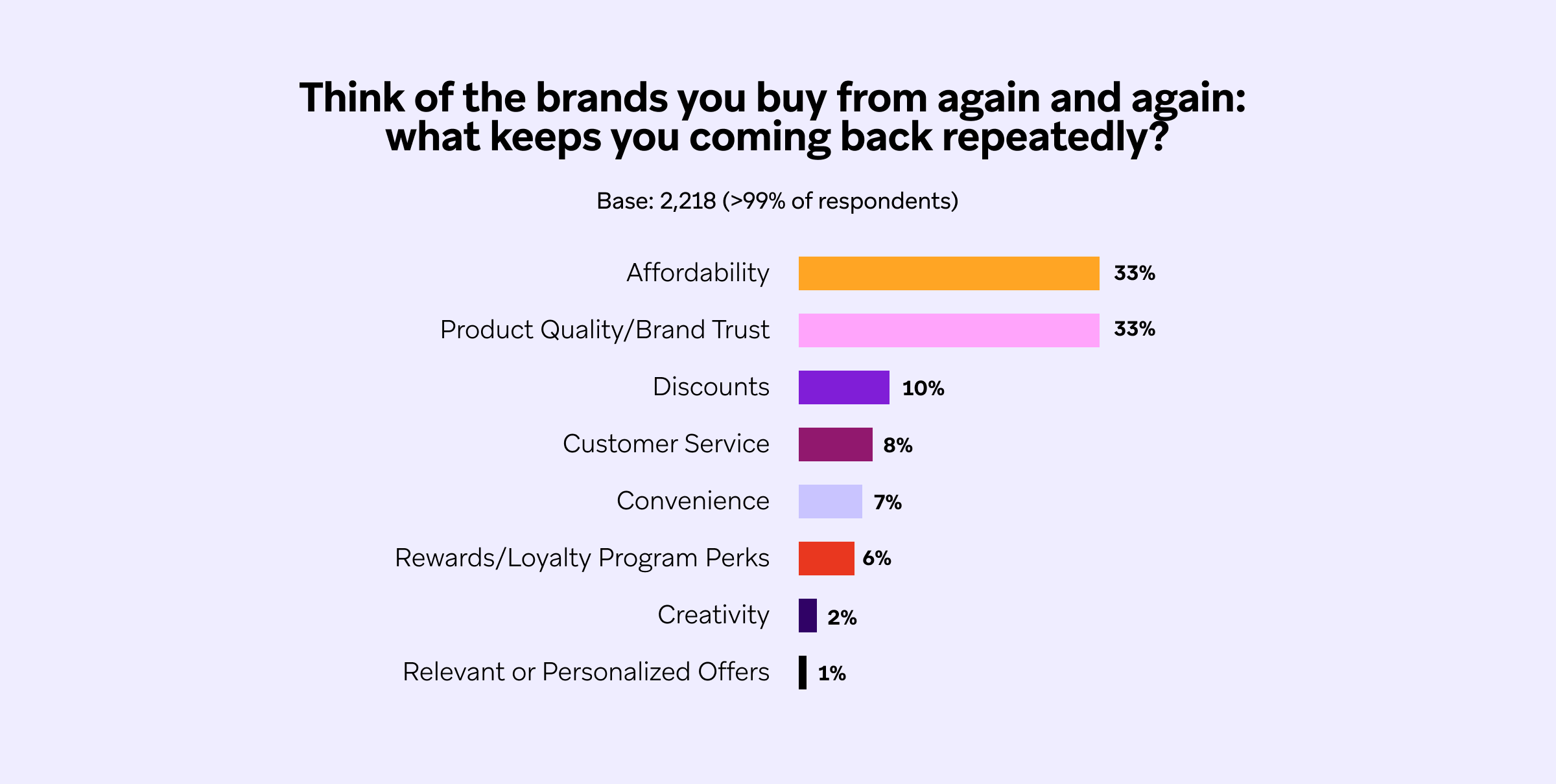
2. Consumers lack trust that brands are using their data responsibly
Almost half of participants (47%) are hardly confident or aren’t confident at all that brands are using their data responsibly. This can lead to customers choosing to disengage, which proves to be a problem when their data is needed to fulfill the tailored experience they desire. About one-third (30%) of consumers said they were less willing to share their data than they were three years ago and only 26% said they were more willing, which shows a decline that could have a major impact on a brand's ability to connect with their customers.
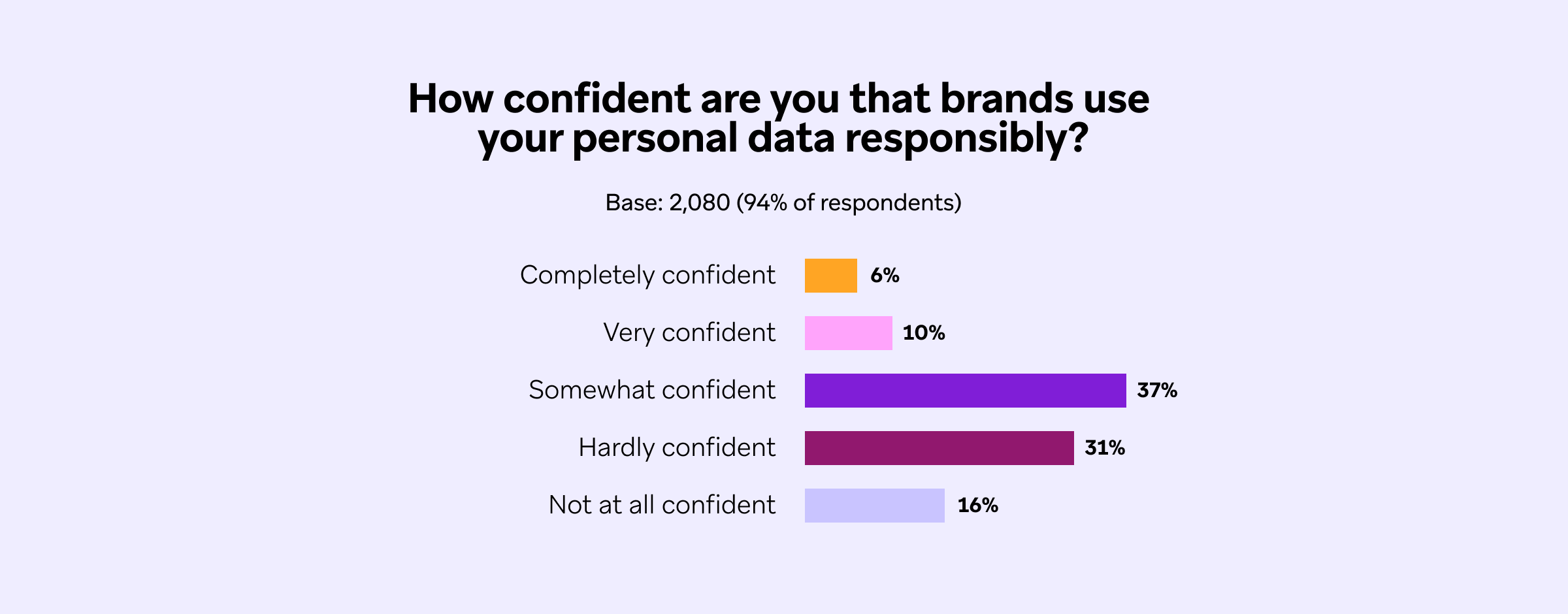
3. Consumers demand personalized experiences but are cautious of technology that enables it
Despite 80% of consumers saying that personalized experiences are at least somewhat important when making purchases, only 29% say they feel comfortable with AI being used to do so. In this large gap between what consumers know and what they trust, there is space for brands to build a better understanding of AI and nurture a positive feeling towards emerging technologies. AI can be used to unlock more creative and compelling campaigns as well as more tailored and relevant experiences.
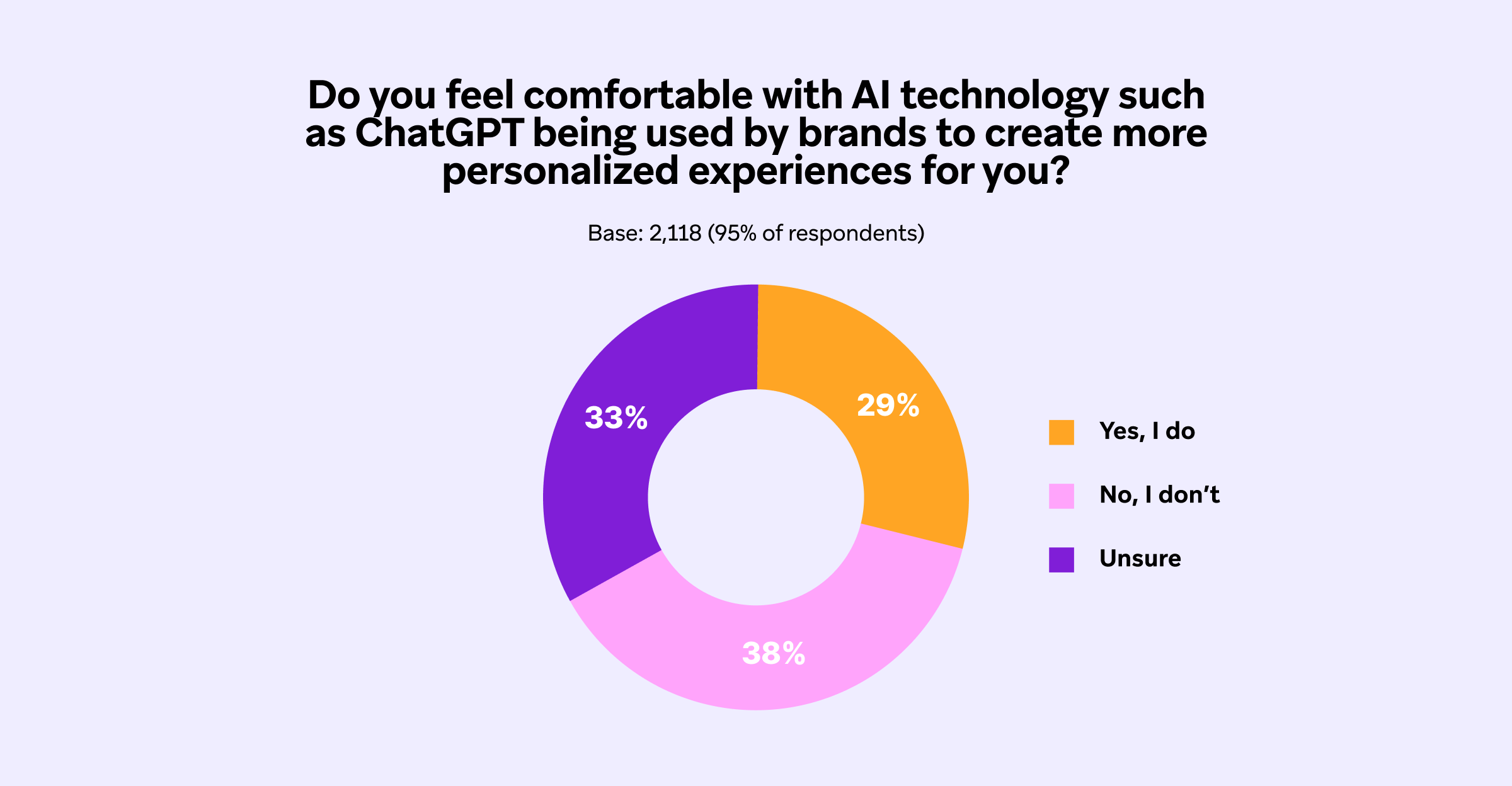
What Other Customer Loyalty Research Studies Reveal About Building Long-Term Consumer Relationships
1. It pays to invest in long-term relationships
Customer loyalty research conducted by the inventor of the net promoter score, Frederick Reichheld of Bain & Company, has found that when companies are able to increase customer retention rates by as little as 5%, they can achieve gains in profits by as much as 25% to 95%.
2. Customer loyalty isn’t exclusive and signing up for a loyalty program doesn’t guarantee engagement
On average, customers in the US belong to 18 loyalty programs, yet about half are actively used.
3. Companies are losing more money than ever for every new customer acquired
A 2022 study reveals that due to factors like increased privacy regulations and the decline of third-party cookies, the cost of acquiring new users is climbing and now retailers are losing an average of $29 for every new customer acquired—that’s up 222% from 2013.
4. Brands are investing in customer retention about as much as they are on customer acquisition
In light of rising customer acquisition costs, it should come as no surprise that the days of throwing money at attracting new users above all else are gone. According to the Braze 2024 Global Customer Engagement Review analysis, a near parity has been achieved between acquisition and retention spending, with about 50% of respondents’ budgets being used for new user acquisition, with the other half being allocated toward customer retention, signaling marketers realize the value of spending resources to retain existing customers and bolster loyalty.
More Insights About Building Long-Term Customer Loyalty
What is consumer loyalty, and why is it crucial for brand success?
Consumer loyalty happens when customers actively choose a brand over the competition.
Consumer loyalty can be measured quantitatively using customer engagement key performance indicators (KPIs), such as customer lifetime value (CLV), net promoter score (NPS), and purchase rates. At the same time, however, brands must also balance focusing on quantitative performance with monitoring qualitative outcomes, such as meeting customer needs and responding to customers’ emotions. That’s why we like to think of loyalty as a series of ongoing meaningful moments between customers and brands that foster a mutually valuable relationship.
Developing consumer loyalty is crucial for brand success because, according to Harvard Business Review, loyalty is good for boosting profits, keeping costs in check, and generating customer referrals.
How can firms interested in building long-term customer loyalty adapt their strategies?
Our Braze Loyalty in Action guide introduces several strategies for winning over customers and keeping them for the long term, including:
- Using real-time segmentation to enable the kinds of truly personalized experiences customers expect.
- Gathering customer feedback via polls and surveys, and acting on these insights to improve experiences for customers.
- Leveraging reporting and analytics to evaluate the performance of your loyalty strategies.
- Building a practice of measuring, testing, and iterating to fine-tune your strategies and prioritize efforts that are resulting in your company’s desired outcomes.
What are the primary drivers of brand loyalty in today's competitive market?
As highlighted in the Braze customer loyalty research findings presented above, the top two factors that motivate customers to buy from brands again and again include affordability and product quality/brand trust. These factors were 3.3X more likely to be selected compared to the next most impactful factor—discounts.
How can brands effectively communicate the "love language" of loyalty to build customer loyalty?
As with any relationship, how the parties involved in the relationship—companies and consumers—communicate is paramount to creating long-term bonds. To lock in loyalty, brands should take a three-step approach to communicating.
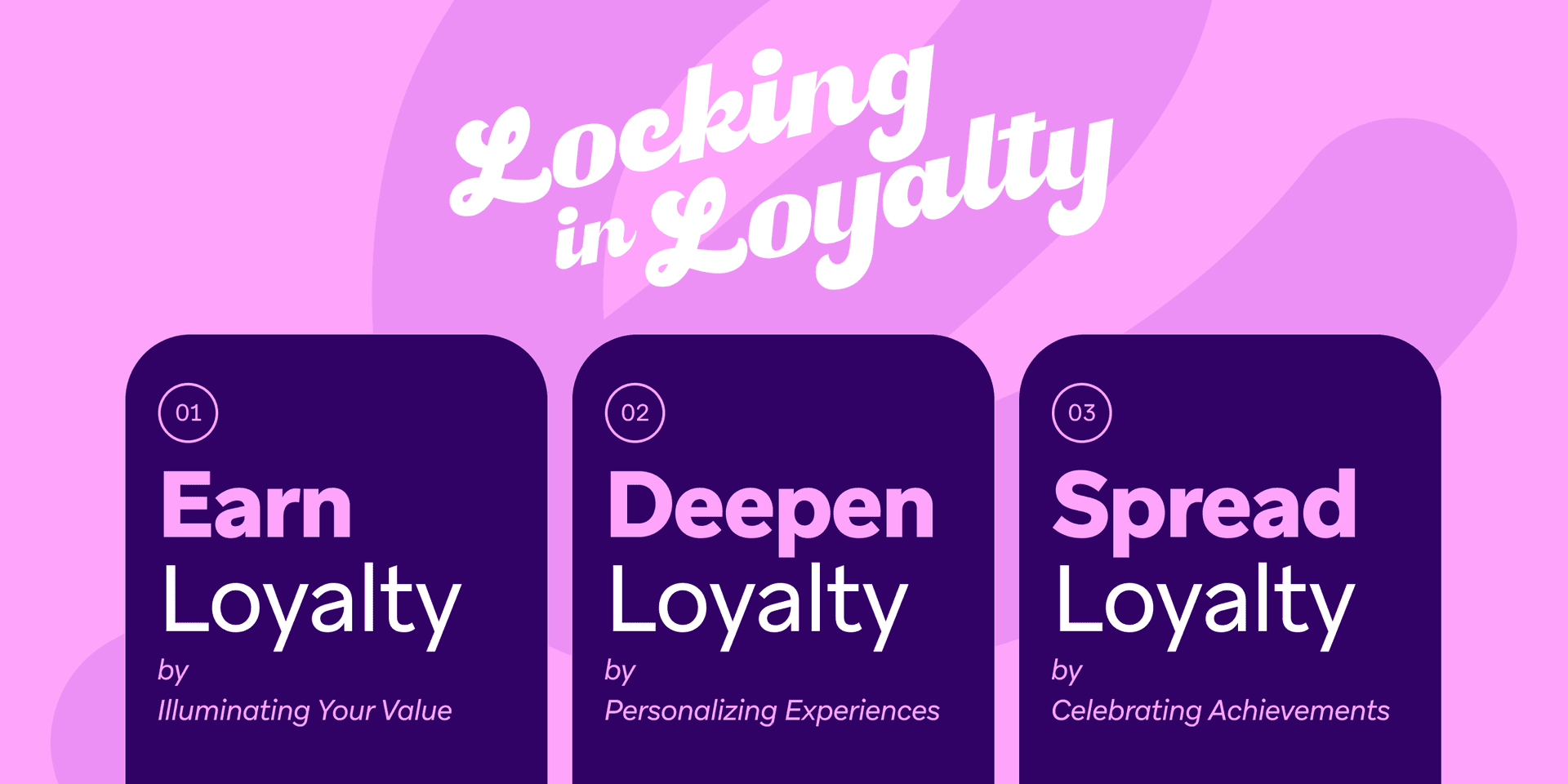
STEP 1: Earn Loyalty
As cited above in the summary of the findings of the Braze loyalty study, consumers rank “product quality/brand trust” just as important as “affordability” when it comes to factors that motivate them to make repeat purchases. They were also 3X more likely to select those factors than discounts. This implies that customers need much more than just the best price from your brand—they need to trust you.
To communicate in a way that instills trust, companies need to demonstrate their value in ways that map directly to consumer needs. Your brand can do this in a number of ways, including by:
- Creating in-product surveys to gather customer feedback and insights about customers’ specific needs.
- Priming customers for ongoing communication so they understand the value of opting into hearing from your company.
- Sending value demonstration campaigns highlighting how customers benefit from your brand’s products and services on an ongoing basis.
STEP 2: Deepen loyalty
You don’t want customers to download your app, join your mailing or SMS list, opt in for push notifications, or become a member of your loyalty program, but then never engage. You want users to remember, prioritize, and actively choose your brand over the competition.
To gain an advantage, personalize the experience, such as:
- Educating users about your company’s products, features, or services they haven’t used but would benefit from.
- Leveraging gamification campaigns.
Celebrating contextualized milestones using first-party data.
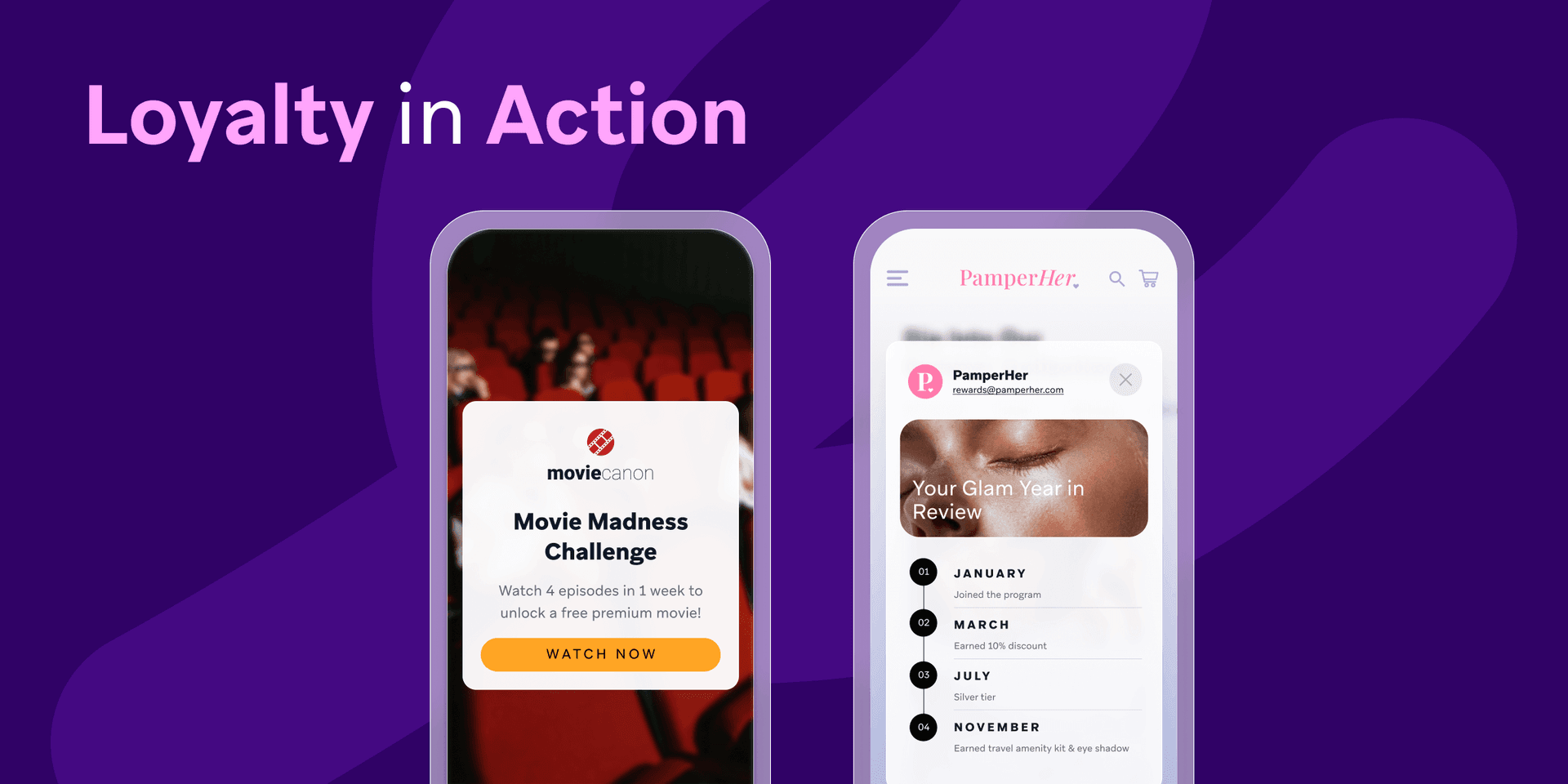
STEP 3: Spread loyalty
Celebrating your customers’ achievements with your brand, whether that’s new levels of loyalty status unlocked or number of episodes streamed, is a powerful way to encourage your users to share their progress with others, therefore generating more referrals for your brand. Thanks to a phenomenon known as “referral contagion,” these referrals in turn are more likely to demonstrate more loyalty behaviors than customers acquired via other channels, such as by making more purchases and attracting 30% to 57% more new customers through referrals than other types of customers.
Ideas that marketers can use to celebrate customers’ achievements and spread loyalty include:
- Inviting customers to unlock exclusive features or experiences based on their level of engagement with your brand.
- Incentivizing referrals to encourage current users to introduce prospects to your brand.
Providing shareable content using brand experiences.
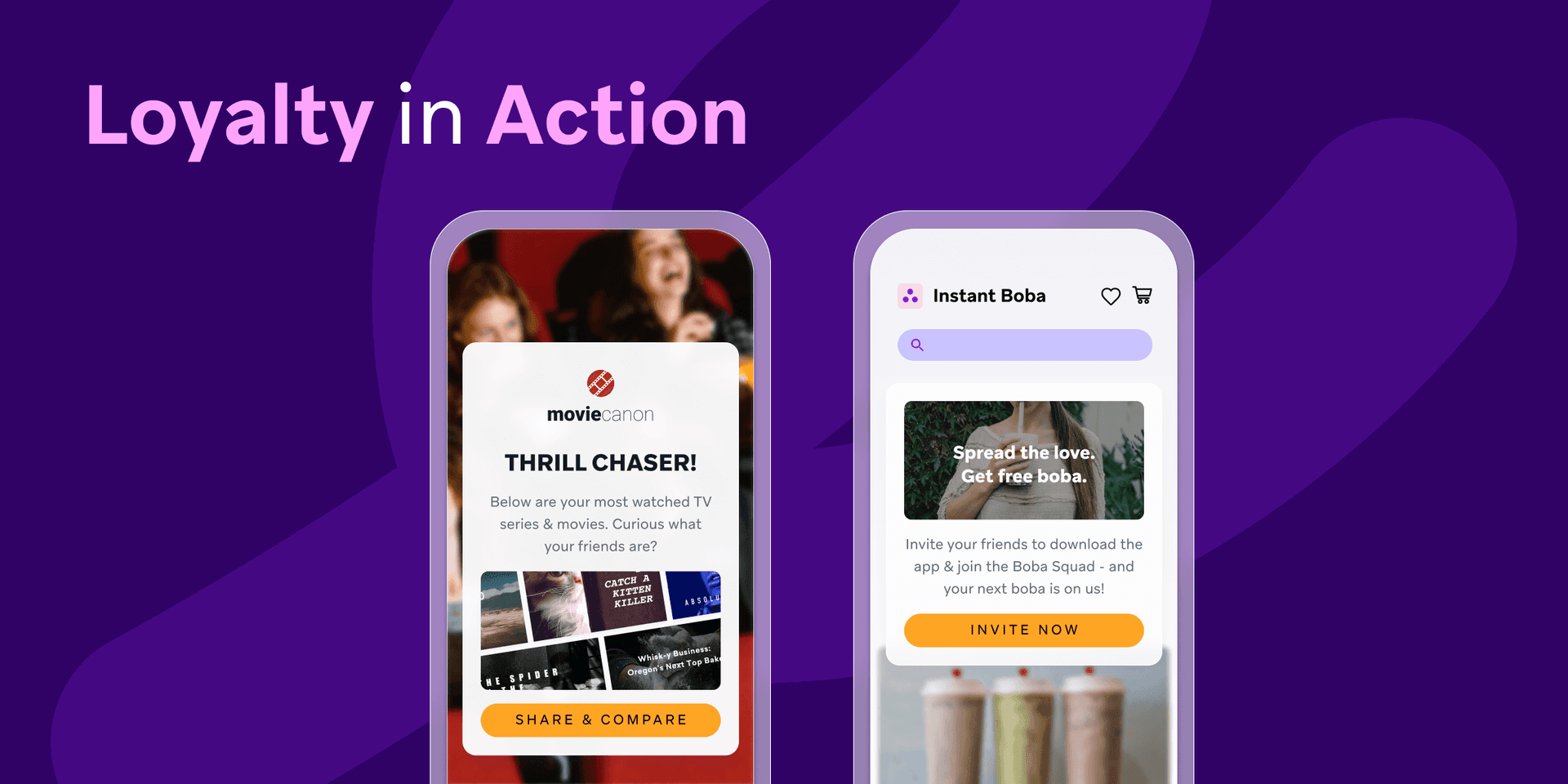
The bottom line: You need to speak to your customers using the right love language for the right users at the right time. While every one of these ideas may not apply to your brand, allow the “earn, deepen, spread” framework to spark inspiration for crafting loyalty engagement strategies that are sure to capture the hearts of your customers.
Want to learn how to deliver customer experiences that win hearts and wallets? Check out our Loyalty in Action guide.
What loyalty strategies are most effective for retail brands?
Based on our experience working with top retailers as well as our own proprietary data, we’re identified five strategies that are effective for retail brands to grow customer loyalty.
1. Institute measurement processes to develop a 360-degree view of your customer.
The first step in improving brand engagement efforts is to measure and analyze the current behaviors and preferences of your customers. Bridging loyalty and customer experience (CX) initiatives creates a unified view of the customer that synthesizes historical, real-time, and predictive data, helping retailers make more customer-centric decisions. With more than half of consumers engaging with three to five channels across their purchase journeys according to McKinsey & Company research, embracing a holistic POV helps future-proof your customer relationships, lowering the risk that you’ll be caught off guard by an emerging platform, device, or consumer trend.
2. Collaborate across departments to fulfill omnichannel expectations.
Consumers don’t view experiences in silos and expect a consistent and seamless purchase journey no matter where, how, or when they might want to interact with your brand. This new omnichannel mindset requires that retailers similarly break through the boundaries dividing traditional silos like mobile and email, or loyalty and CRM, ensuring that everyone is working in concert towards the same customer-driven goals. The Braze Brand Humanity Index is based on research identifying what attributes make a brand feel human to customers as well as the business impact of that Brand Humanity. As part of this study, we found that consumers reported greater loyalty to brands that treat them in a “considerate” way (“communicates with me using preferred contact method”).
3. Use personalization, and use it thoughtfully.
Personalization helps retail brands stand out from the crowd and deliver stronger results, yet Braze research on personalized experiences reveals less than half of marketers are using personalization to tailor campaigns based on things like an individual’s customer account information or past or real-time engagement and purchasing data (items purchased, browsing behavior, clicks, and views). That’s a missed opportunity, considering that a Braze analysis finds that personalization tools like Liquid and Connected Content can improve open, click, and conversion rates. For instance, using Liquid personalization for abandoned intent campaigns can boost conversions by 4.4X and using Connected Content can increase open rates for web messaging by 4.1X and unique click rates for email by 1.7X.
4. Leverage location and other contextual data to spur meaningful customer interactions.
With consumers’ screens packed with branded apps and content streams, retailers need to invoke a sense of urgency and relevance to break through the noise and spark engagement. Technology that enables retailers to engage with customers using real-time data like device type, weather, location, and more—allows brands to reach customers at the most relevant times and places, and drive meaningful actions as a result.
Research from Braze shows contextual messaging powered by action-based and API-triggered campaigns can result in higher engagement, including:
- A 5.5X and a 3.7X lift in open rates for mobile push campaigns from action-based and API-triggered campaigns, respectively
- A 5X and a 2.9X lift in conversion rates for action-based and API-triggered campaigns, respectively
5. Embrace machine learning and AI to personalize experiences at scale.
When it comes to effective marketing, context is everything. Even the most customized offers and discounts matter little if they aren’t delivered at the right time and place. But in order to achieve true one-to-one marketing, retailers must partner with technology companies that can leverage machine learning to personalize experiences at scale. Through its collaboration with Braze, online retailer Overstock.com personalized its web landing pages and email messages, tailoring content for each user based on their perceived intent, previous purchases, referral source, and other contextual cues. The result has been double-digit increases in open rates, with the highest lifts coming from "non-engaged" customers who had not opened an email or message in the previous 30 days.
What are some proven techniques for retaining modern consumers?
In the Braze guide Retention by Design: Your Anti-Churn Playbook, we reveal five tactics marketers can use to drive stronger retention. Here’s an overview of these powerful techniques:
- Customer onboarding: Teach new users about the value your brand provides—and encourage deeper engagement sooner, bolstering retention—right from the start with more effective onboarding.
- Priming for permissions: Get customer opt-ins you need to gather customer data and send customer outreach by clearly explaining the benefits of taking these actions.
- Asking for customer feedback: Find out and address your customers’ top pain points, interests, wants and needs, and sources of delight.
- 1:1 personalization: Show customers you know what they care about and give them reasons to keep coming back for more by tying your marketing outreach to their individual user behaviors.
- Experimentation: Embrace testing and learning to identify opportunities to improve your retention over time.
How does personalization impact customer loyalty and retention?
Personalization can have a profound impact on behaviors that lead to customer loyalty and retention. McKinsey & Company research has found that personalization leads to higher customer engagement and can boost average revenue by 10-25%. In addition, Braze research cited above finds that personalization capabilities can help brands drive open, click, and conversion rates, which over time can lead to stronger loyalty and retention outcomes.
Why is customer loyalty essential for sustainable brand growth?
Customer loyalty is essential for sustainable brand growth because it helps brands combat the rising costs of acquiring new customers and reap the benefits of retaining customers over time, including increased cost savings, profits, and customer referrals.
As discussed earlier, the cost of acquiring new customers has been increasing over the past decade and, on average, brands actually lose $29 per new customer acquired. At the same time, as cited above, customers acquired via referrals are better for business, thanks to the “referral contagion” phenomenon mentioned above, which increases the likelihood that these customers will make more purchases and generate even more referrals, compared with customers acquired via other channels.
Related Tags
Be Absolutely Engaging.™
Sign up for regular updates from Braze.
Related Content
 Article16 min read
Article16 min readChoosing the best AI decisioning platforms for 2026 (across industries)
February 12, 2026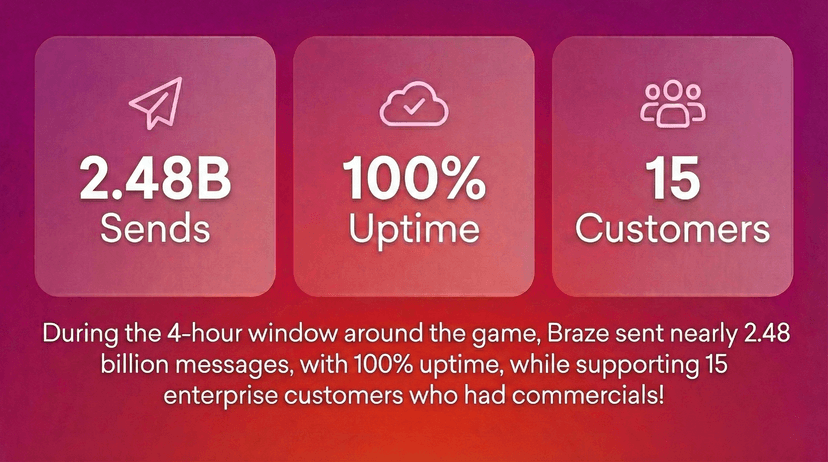 Article3 min read
Article3 min read2.4+ billion sends, zero fumbles: How Braze supports leading brands during the big game
February 09, 2026 Article4 min read
Article4 min readBeyond Predictions: Why Your Personalization Strategy Needs an AI Decisioning Agent
February 09, 2026